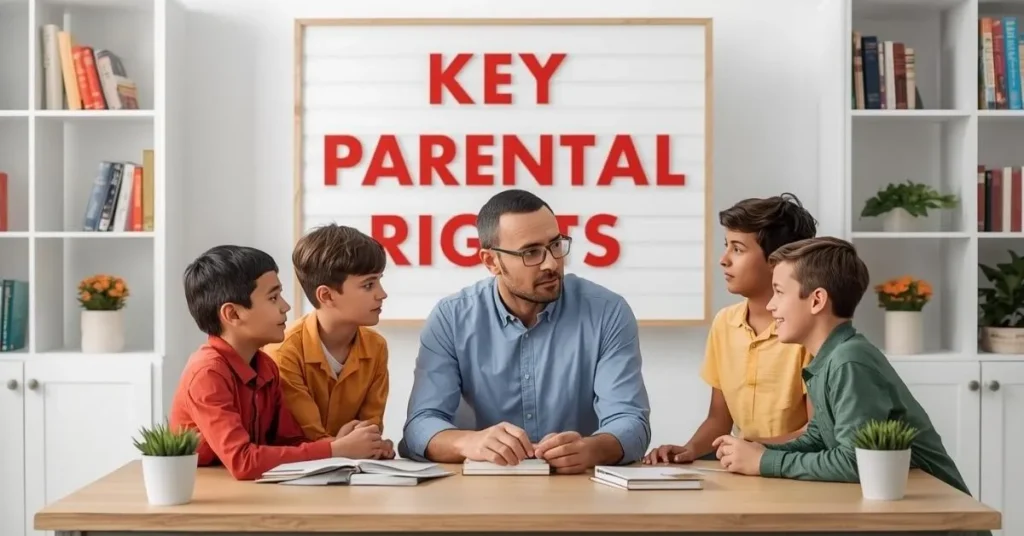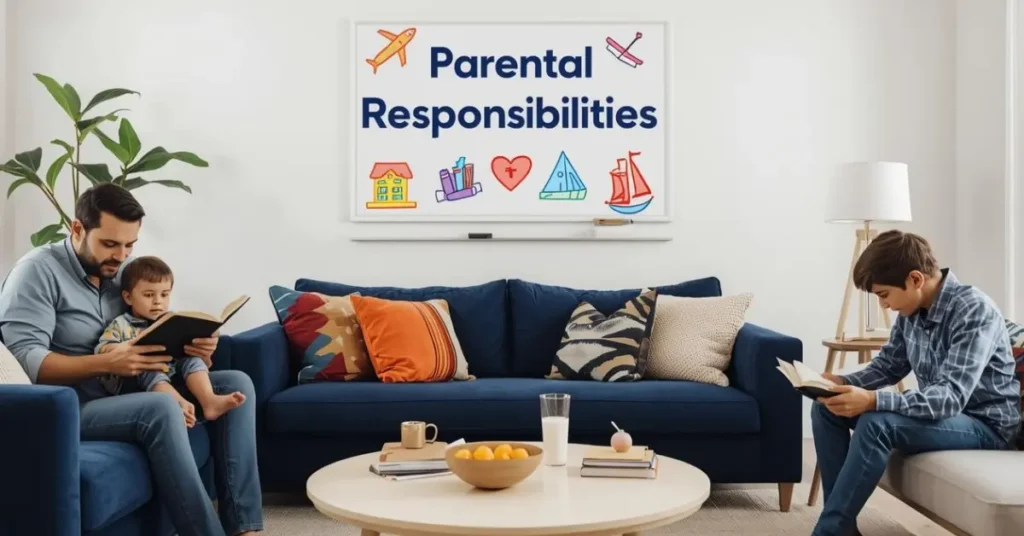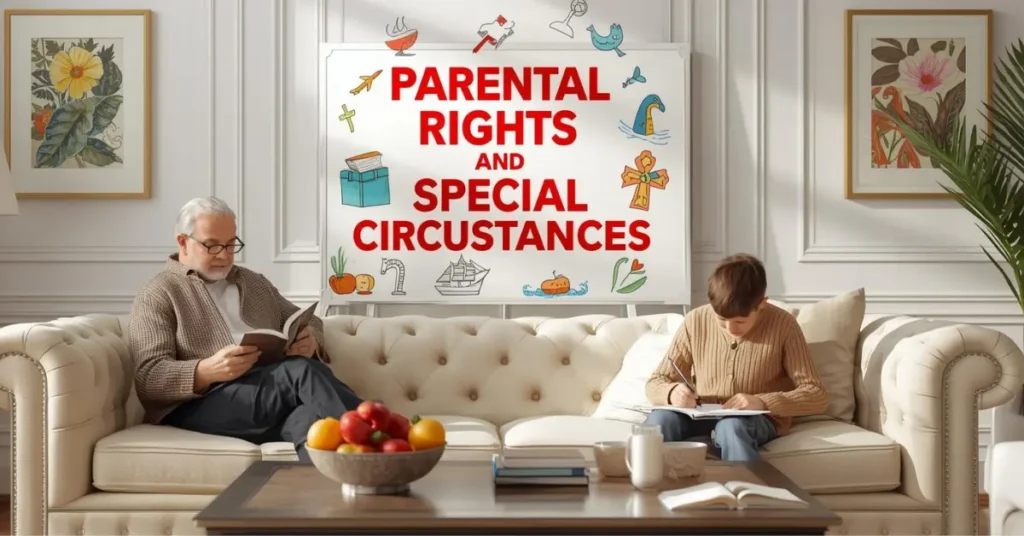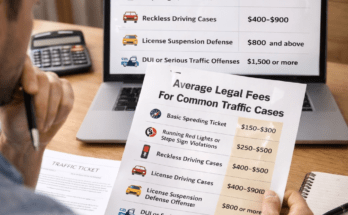Understanding Parents Legal Rights is essential for mothers and fathers who want to protect their relationship with their child and make informed decisions about their family’s future. These rights include the ability to make important choices about a child’s education, healthcare, religion, and overall upbringing, even in situations involving separation, divorce, or custody disputes.
Family law courts aim to protect the child’s best interests while balancing parental responsibilities, custody arrangements, visitation rights, and financial support obligations such as child support. Knowing how legal custody, physical custody, parenting plans, and guardianship rules work helps parents navigate legal processes with confidence. In this guide, we will explain key parental rights, common legal challenges, and the options available so families can better understand their rights and responsibilities while ensuring a stable and supportive environment for their children.

Table of Contents
The Legal Definition of Parental Rights
Under U.S. law, parental rights refer to the legal authority granted to parents to make significant decisions about the lives of their children. These rights cover a broad spectrum, including decisions related to custody, education, healthcare, religion, and a child’s general welfare.
At the core of these rights is the right to raise and care for one’s child, which can be contested or regulated in cases of neglect, abuse, or parental incapacity.
The legal foundation of parental rights lies in constitutional protections. The Fourteenth Amendment provides due process protections that ensure parents are entitled to make decisions regarding their child’s care without unnecessary government interference.
Courts generally uphold the notion that parents, not the state, should have the ultimate authority over their child’s upbringing unless there is compelling evidence that parental decisions are harmful to the child.
The Parental Kidnapping Prevention Act (PKPA), for instance, is one such law that safeguards parents’ rights to custody, while state laws govern specific aspects of parental responsibilities, like child support and visitation.

Key Parental Rights
1. Right to Custody
The legal right of a parent to raise and decide on behalf of their kid is known as custody. Legal custody and physical custody are the two primary categories of custody.
The right to make important life decisions for a child, such as healthcare, education, and religion, is known as legal custody. Physical custody involves where the child lives and with whom.
Custody decisions are generally made based on the best interest of the child, which is a legal standard courts use to determine the arrangement that best serves the child’s emotional, educational, and physical well-being.
The Uniform Child Custody Jurisdiction and Enforcement Act (UCCJEA) helps determine which state has jurisdiction over custody cases, especially in situations where parents live in different states. UCCJEA aims to prevent forum shopping, ensuring that the custody decision is made in the child’s home state to avoid confusion.
2. Right to Make Decisions About Education
One of the fundamental rights of parents is the ability to make decisions about their child’s education. Parents have the authority to choose which schools their children attend, whether public or private and to make decisions about the curriculum and educational needs, including any special education services required.
The Fourteenth Amendment protects this right, and the landmark case Pierce v. Society of Sisters (1925) reaffirmed that parents have the right to direct their child’s education, even in the face of state laws that might contradict their wishes.
Parental involvement also extends to the Individualised Education Programs (IEP) process for children with disabilities. Parents are critical in the creation and modification of their child’s IEP, which outlines educational goals and services.
3. Right to Healthcare and Medical Decisions
Parents also have the right to make medical decisions for their children, which includes consent for surgeries, medical treatments, vaccinations, and mental health care.
This right, however, can be limited in certain situations, especially if the state intervenes in cases where the child’s safety or well-being is at risk. Some states have minor consent laws that allow children to make certain medical decisions independently, such as those related to sexual health or mental health services.
In emergencies, if a parent is unavailable, healthcare providers may seek court approval to act in the best interests of the child. However, parents generally retain the final say in non-emergency medical decisions unless deemed unfit by the court.
4. Right to Religious Upbringing
One essential parental right is the authority to decide how a kid will be raised religiously.
This includes the decision to practice a particular religion or expose the child to specific religious teachings and traditions.
Wisconsin v. Yoder (1972) upheld the rights of parents in religious groups to remove their children from formal schooling in favour of religious education, stating that the state could not interfere unless a compelling state interest existed.
However, public schools are subject to restrictions concerning religious practices, ensuring that children are not coerced into religious observance. Religious rights must be balanced with a child’s welfare, especially if the practices pose any risk to the child’s health or safety.
5. Right to Discipline and Guidance
There are limits to what parents can legally do when disciplining their children. Abuse cannot be justified by claiming the right to discipline.
The Child Abuse Prevention and Treatment Act (CAPTA) outlines specific behaviours that can be deemed neglect or abuse, such as physical punishment that results in injury or emotional harm.
States have their own regulations on acceptable discipline, and Child Protection Services (CPS) can intervene if parents exceed those bounds.

Parental Responsibilities
Parental responsibilities encompass the duty to provide for a child’s basic needs, such as food, shelter, education, and healthcare. Parents are required to ensure their children are protected from harm, receive appropriate medical care, and are supported emotionally and financially.
These duties are grounded in both state and federal laws, with the Child Support Enforcement Act ensuring that non-custodial parents meet their financial obligations.
In situations of abuse, neglect, or abandonment, parental rights can be limited or revoked. This is a serious legal process that typically involves investigations by Child Protective Services (CPS) and can lead to the termination of parental rights. Foster care and adoption are options for children whose biological parents are judged unfit.
Restrictions on Parental Rights
In the United States, parental rights are not absolute and may be restricted under certain circumstances. This occurs when a parent’s ability to care for their child is questioned or when the state intervenes to ensure the child’s safety and well-being.
State Participation and Child Protective Services (CPS) Function
Protecting children from abuse and neglect requires Child Protective Services (CPS). CPS investigates claims of child abuse, neglect, or inadequate care, often following reports from teachers, doctors, or concerned family members.
CPS has the authority to remove children from unsafe environments and place them in temporary foster care while investigations are ongoing. The rights of parents are impacted during such investigations, particularly regarding custody arrangements and visitation.
Under the Child Abuse Prevention and Treatment Act (CAPTA), CPS is empowered to intervene in cases of child abuse or neglect, including instances where parents fail to provide proper care.
This legal framework ensures that the best interests of the child are prioritised, which may result in temporary or permanent restrictions on parental rights if the child’s safety is at risk. In extreme cases, the state may seek to terminate parental rights permanently.
Termination of Parental Rights
In extreme cases where a parent is deemed unable to provide adequate care for their kid, the court may decide to terminate their parental rights. Grounds for termination include severe neglect, physical or emotional abuse, abandonment, or a failure to provide financial support for the child.
The steps to take to end parental rights are laid out in the Application and Safe Families Act (ASFA). It encourages timely decisions about child welfare to ensure that children are not left in unsafe or uncertain situations.
Once parental rights are terminated, the parent loses all legal authority over the child, including decision-making powers related to education, healthcare, and religion. In many cases, this termination is followed by the child being placed for adoption.
Parental Rights in Divorce and Separation
Parental rights are often put to the test during divorce or separation, especially when parents cannot agree on custody or visitation arrangements.
The courts are tasked with determining the best interests of the child, and this can involve complex decisions about custody, visitation, and child support.
Additionally, understanding the divorce cost in North Carolina can help parents plan for the financial aspects of their case as they navigate these decisions.
How Parental Rights Are Affected in Divorce or Separation
In a divorce, both parents maintain their parental rights, but how those rights are exercised may change based on the custody arrangement.
Parents may either share legal custody, meaning both parents have equal decision-making authority, or one parent may be granted sole custody. Visitation rights are typically awarded to the custodial vs non-custodial parent, allowing them to spend time with the child.
The Uniform Parentage Act (UPA) is a legal framework that ensures the rights of parents are protected, even in cases where they are not married. The UPA also allows for the establishment of paternity, which is critical for unmarried fathers to assert their parental rights.
The best interest of the child standard guides judges in making custody determinations, focusing on factors such as the child’s relationship with each parent, their health, and the stability of each household.
Custody Arrangements and Visitation Rights Post-Divorce
In cases of shared custody, both parents share the responsibility of making decisions regarding the child’s upbringing, including education and healthcare.
Sole custody, on the other hand, grants one parent full legal and physical custody, with the non-custodial parent typically receiving visitation rights. In both scenarios, family law statutes, family law reforms in California, and state-specific guidelines govern the rights of the parents and the child’s best interests.
Protecting Parental Rights
Even though parental rights are well-established, they can be challenged in various situations. For example, a parent may face allegations of child abuse, neglect, or other behaviours that could potentially lead to a loss of parental rights.
Legal Process for Defending Parental Rights
If a parent’s rights are challenged, they can take legal action to protect them. This often involves filing motions in family court to contest custody changes, visiting rights, or decisions made by CPS. Seeking legal representation from a family law attorney is critical to ensuring that a parent’s rights are defended and upheld.
Challenges to Parental Rights
Some of the most common challenges to parental rights include disputes over custody, allegations of parental alienation (where one parent undermines the other’s relationship with the child), and child abuse investigations. In such cases, it may be necessary to file a child abuse report to initiate an official investigation.
These challenges often require mediation, negotiation, or court proceedings to resolve the issues. Parents should seek expert legal counsel to guide them through these processes and protect their rights.

Parental Rights and Special Circumstances
In certain circumstances, parental rights can become more complex, particularly for unmarried parents, grandparents, or third parties.
Unmarried Parents and Parental Rights
Unmarried fathers and mothers may face different legal challenges in asserting their parental rights. For unmarried fathers, the establishment of paternity is often required before they can assert their rights to custody or visitation.
Once paternity is established, the father is granted legal rights similar to those of married fathers, including the right to make decisions about the child’s welfare.
Grandparents and Third-Party Rights
In some cases, grandparents or other third parties may seek custody or visitation rights, especially if the child’s biological parents are unable or unwilling to care for them.
Grandparents’ rights laws allow for visitation or custody in certain situations, particularly if the parents are unfit or if there are concerns about the child’s welfare. These rights vary significantly by state and depend on the specific circumstances of the case.
Rights of Foster and Adoptive Parents
Foster parents also have certain rights regarding their foster children, especially when it comes to making decisions about healthcare, education, and welfare. However, these rights are typically not as extensive as those of biological parents.
Adoptive parents, on the other hand, enjoy full parental rights once the adoption is finalised, which includes the right to make all decisions related to the child’s upbringing.
Final Thoughts on Your Legal Options
Understanding parental rights is crucial for any parent navigating the legal system, whether it’s in the context of child custody, divorce, or child welfare disputes. Parents must be aware of their legal rights and responsibilities, as well as the potential challenges they may face.
Consulting with a qualified family law attorney is often the best way to ensure that parental rights are protected.
Balancing parental rights with the best interests of the child is essential, and parents should always prioritise the child’s safety, stability, and emotional well-being when making decisions about custody, visitation, and other matters.





One Comment on “Parents Legal Rights: Everything You Need to Know”